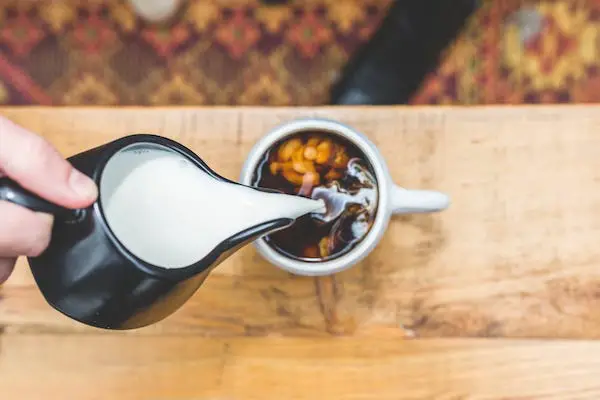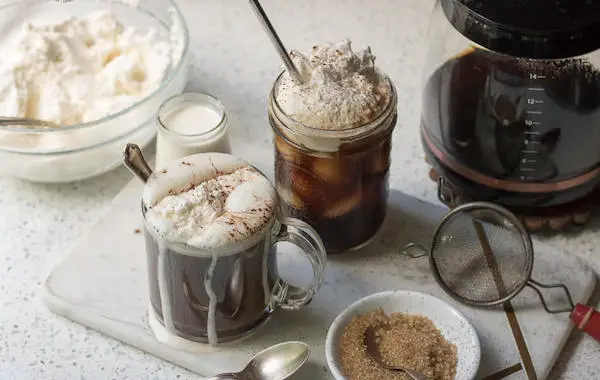Caffeine can be a great booster that activates our brain and helps us start a new day energetically. However, for people who are not familiar with this substance or those who cannot take too much caffeine, this booster can bring about some severe side effects like restlessness, headache, insomnia, or dizziness.
Hence, if you love the taste of coffee but cannot take too much caffeine, you may wonder how to reduce the amount of caffeine in your coffee. When it comes to decreasing the caffeine in coffee, one of the most frequently asked questions is “Does adding milk to coffee reduce caffeine?”. The short answer to this question is no, it does not. Read the article below to find out more details on this answer.
Contents
Does Adding Milk To Coffee Reduce Caffeine?
One common misconception is that milk can lessen the effect of caffeine in coffee. Hence, putting milk in coffee is considered as a way to decrease the effects of caffeine. However, this is not at all the case. Adding milk neither reduces the caffeine of your coffee nor increases it.
However, there are benefits to add milk to coffee. Milk contains calcium and protein that act as binding agents and have a neutralizing effect on the acid in coffee. You can easily notice this effect when adding milk to coffee with a higher acidity level. This kind of coffee is usually more bitter and sour than regular coffee. The addition of milk to this kind of coffee will immediately make the bitter taste milder. This taste can be friendlier to those who are not familiar with the bitter taste of black coffee.

Thus, adding milk can increase the nutrients in your coffee. Milk adds carbohydrates, protein, and calcium, making your daily cup of coffee more energizing and fulfilling. Yet, adding milk also means adding calories to coffee. Hence, if you are actively counting your calories, you may want to notice the calories adding to your zero-calorie black coffee.
Ways To Decrease Caffeine In Coffee
If you would ask the question “Does adding milk to coffee reduce caffeine?” because you want to find out how to decline the caffeine in your daily coffee, here are some ways that help you to do just that.
Reduce the amount of coffee ground
The amount of coffee ground directly affects the caffeine content in your coffee. Hence, less coffee ground will instantly make your cup of coffee weaker.
If the caffeine in your coffee is too strong for you, all you need to do is to reduce the coffee ground in your daily coffee recipe.
Pay attention to the grind size of your coffee
Different coffee grind sizes result in different levels of coffee and caffeine extraction. The finer coffee ground will allow the coffee to be extracted much faster when being in contact with hot water. Meanwhile, this process is much slower with the coarser coffee ground. Hence, you can opt for a coarser coffee ground if you want less caffeine in your coffee.
Choose decaf coffee
You can buy decaf coffee or mix your regular coffee ground with decaf coffee for a lower content of caffeine. This is also a fun way to customize your own coffee. Thus, the taste of this mix will not differ that much from your normal black coffee.

Speed up the brewing process
The less time spent on the brewing process means less coffee extraction happening during the process. Hence, another effective way to reduce the caffeine in your coffee is to speed up the brewing process.
Refrain from cold brew
If you are a fan of cold brew, this may be bad news. Since cold brewing the coffee ground means letting the coffee ground steep in cold water for a long period of time, the coffee extraction process of cold brew coffee is much more intensive than that of regular coffee. As a result, cold brew coffee has much higher caffeine than coffee brewed with hot water.
Opt for Arabica coffee beans
The most common coffee beans are Arabica coffee beans and Robusta coffee beans. Robusta beans usually make more intense coffee while Arabica makes much lighter coffee with lower caffeine content.
How To Get The Caffeine Out Of My System?
Since using more caffeine can make you feel restless and leave some side effects on your body, you should try the following ways to exhaust the caffeine in your body.
- Drink lots of water: Drinking water can lessen the effect of caffeine in a short time. Hence, if you want to reduce the effect caffeine has on your body, drink a cup of water right after a cup of coffee.
- Exercise: Exercising can help speed up your body’s digestion of caffeine. Thus, it is also a good way to use up the energy from caffeine fast.
- Vitamin C: Since the high caffeine level in your body can affect the vitamin C level in your system, adding vitamin C can balance out the effect of caffeine.
FAQ
Does coffee milk have caffeine?
Coffee milk is essentially milk with the addition of coffee-flavored syrup. The content of caffeine in your coffee milk depends on how the coffee syrup in the milk. Yet, since the syrup is made from boiling an insignificant amount of coffee ground with sugar, the caffeine content is also negligible. Hence, the answer is that coffee milk has little to no caffeine.
Does milk have caffeine?
Caffeine is a stimulant that activates the human nervous system and can help us stay alert. This substance can be found naturally in cacao, coffee, and tea. Milk is rich in nutrients but caffeine is not one of them. So the answer is no, milk has zero caffeine.
Does adding milk to coffee decrease staining?
Coffee contains tannins – a substance that gives coffee its distinctive dark color and flavor. The protein in milk can break the bond of the tannins, giving the coffee a lighter color. Hence, adding coffee to milk reduces the effect of tannins, resulting in less staining.
Adding milk to coffee can reduce the staining effect of coffee on your teeth. Thus, the higher the fat content milk has, the less staining the coffee will cause. Hence, if you want to optimize the stain-reducing effect of milk in your coffee, opt for whole milk instead of skimmed milk.
Does using cream or sugar in coffee decline caffeine?

The answer is, again, no, adding cream to coffee or sugar does not reduce caffeine. The cream is another variation of milk. Hence, like milk, the cream has no neutralizing effect on caffeine. Hence, if you look for a way to reduce the caffeine on your coffee, you can take a look at the methods above.
Conclusion
Now you have had everything you need to answer the question “Does adding milk to coffee reduce caffeine?”. Although milk does not reduce the caffeine content in coffee, there are many other ways you would try to reduce your intake of coffee. Try out our methods to get a healthy dose of caffeine for your daily diet. You can thank us later!
Related post:


